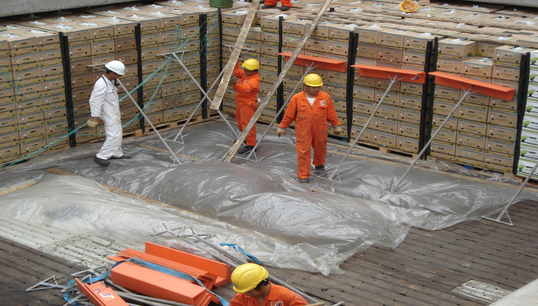- Topics
- Campaigning
- Careers
- Colleges
- Community
- Education and training
- Environment
- Equality
- Federation
- General secretary message
- Government
- Health and safety
- History
- Industrial
- International
- Law
- Members at work
- Nautilus news
- Nautilus partnerships
- Netherlands
- Open days
- Opinion
- Organising
- Podcasts from Nautilus
- Sponsored content
- Switzerland
- Technology
- Ukraine
- United Kingdom
- Welfare

In 2018, the International Transport Workers' Federation negotiated a clause to ensure work such as lashing is carried out by trained dockworkers – reducing fatigue onboard and preventing injuries and accidents
A critical issue that has emerged in recent years is the practice of requiring seafarers – already overworked – to perform additional tasks such as unloading, checking, receiving, lashing or unlashing cargo.
To address this, the International Transport Workers' Federation (ITF), together with the Joint Negotiating Group (JNG) which represents maritime employers, agreed to the Non-Seafarers' Work Clause (NSWC). This clause was added to International Bargaining Forum (IBF) collective bargaining agreements in 2018.
The clause makes it mandatory that these tasks should be performed by trained and qualified dockworkers, not by seafarers.
After a legal battle with several ship managers, in 2022 a Dutch court ruled in favour of the ITF and ordered employers that have signed up to an IBF agreement to abide by the clause.
Why leave it to the dockers?
Lashing and unlashing cargo are labour-intensive tasks that require specific skills to be performed safely. When seafarers are required to take on these duties, it adds to their already heavy workload, leading to increased fatigue. Dockworkers are trained to perform these tasks efficiently and safely.
Can my crew be required to handle cargo?
In accordance with the NSWC, 'prior agreement' is required to allow for seafarers to do the cargo handling onboard a vessel, if the owner has signed up to an IBF agreement. 'Prior agreement' can be granted by the ITF Dockers Union or appropriate ITF affiliate if there are not enough qualified dockworkers available at the time.
Owners of the vessel are responsible for ensuring that the vessel is in line with the port's safety standards for lashing. In practice, unions recommend procedures to try to maintain safety, such as ensuring the captain brings in a local lashing company to inspect the vessel for safety before lashing takes place.
The NSWC lays out that seafarers performing cargo handling should be qualified and should only do so on a voluntary basis, should receive adequate compensation for the work, and should lash as safely as is possible.
Read more about this here.
Tags
